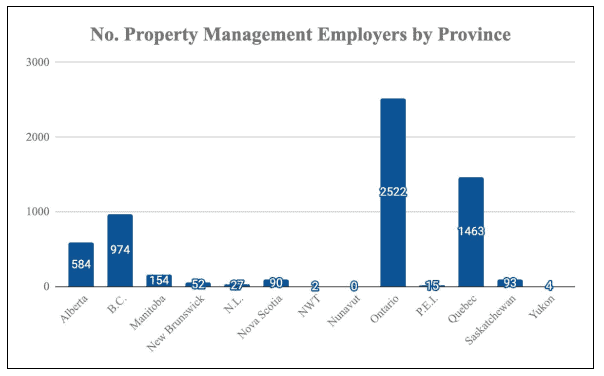Top Real Estate Companies and Solutions in Canada
Real Estate in Canada
Why is real estate such a big deal? Here are some fascinating stats on the state of real estate across the country:
- 76% of Canada’s national wealth (equating to $8.75 trillion) is held in real estate.
- The average cost of a residential home in Canada is $604,000.
- 66% of Canadians are homeowners.
- B.C. and Ontario have the most expensive real estate markets in the country, and Saskatchewan the cheapest. Toronto is the most expensive city.
- Canada is currently in a real estate boom, and has seen a 46% increase in real estate transactions over 2019.
- There is currently $16 billion invested in building construction across the country.
- Purpose-built apartment vacancy rates average 2.4% nationally.
- The average office vacancy rate is 11.9%, down on previous years.

Types of Real Estate Services
You don’t get a trillion dollar industry without numerous market niches, experts and specialized services. Let’s take a closer look at some of the real estate services you can find across Canada:
Real Estate Agents
Real estate agents are licensed professionals who help arrange real estate transactions between buyers and sellers. If this sounds broad, it is - these agents can work in the residential, commercial and industrial sectors, can represent both buyers and sellers, perform valuations, work as sales agents, network, advertise, and advise clients in order to help them make the most of their real estate dealings. These agents typically work on a commission basis (calculated as a percentage of the sold property’s price, around 4-6%) and are valuable when either buying or selling property, of any kind.
Real Estate Brokers
Brokers are commonly confused with real estate agents, but they are in fact distinct. A real estate broker manages or owns a brokerage and supervises multiple real estate agents registered with that brokerage; all the deals performed by the agents at that brokerage are overseen and checked by the broker. Brokers have to have additional training, on top of that required by real estate agents, and they can work independently if they so wish. When buying or selling property, you may work with either a real estate agent (registered with a brokerage), or the broker themselves, depending on your preference, but both will help to ensure your interests are protected. As with real estate agents, brokers work on a commission basis.
Real Estate Developers
Real estate developers buy land, build or commission buildings, and finance real estate deals - all with the end goal of orchestrating and overseeing the development of new property. These professionals can project manage every aspect of a property’s development, and make potentially large profits when things go well. They can work either for themselves, or for hire on behalf of companies seeking new property investment. They can even help with post-build services, like sales, advertising, lettings and property management, and usually charge for their services on a set fee basis.
Real Estate Investment Services
Real estate investment is incredibly popular with individuals, large corporations, pension funds and governments. Real estate investment companies can help you with investing, optimizing, analyzing and managing your real estate investments, whether small or big. They provide advisory services as well as logistical and administrative help, even stretching to property management and tenant services. Many larger real estate investment companies have pre-made portfolios of industrial, commercial and residential real estate that investors can invest in. The cost of accessing services in this field depends on the company you work with, and many have cascading fee structures for differing levels of service.
Commercial Real Estate Services
Commercial real estate services are aimed at the massive commercial side of the property market, including industrial real estate, office space, retail properties, multi-tenant managed residential buildings, and land. These services are broad, and range from advice to transactional assistance, property management, valuation, investment, facilities management and financing assistance. Really anything to do with commercial real estate can be handled by a provider in this field, and the cost will depend on which services you use.
Property Management Services
Property management is a service that some of the more general real estate service companies provide, but there are also a lot of specialist property management companies who focus on this one area alone. Property management includes all aspects of overseeing operations at a specific property, including managing and liaising with tenants, performing daily functions, running the property’s finances, supervising property staff, and maintaining property condition. These services are charged either as a flat rate or as a percentage of rental income from the property.

Lending Services
Lending services play a vital role in the real estate market, as very few people invested in real estate have the cash on hand to pay for everything themselves. Mortgages, capital financing, debt leveraging and other more complex financial tools can all be used to finance real estate transactions, and these tools can be found at private lenders, banks, credit unions, and government institutions.
Professional Services
Lastly, there are a range of professional services that orbit the real estate world and assist with all manner of associated tasks, such as accounting, legal work, construction, design, and so on. Some of these professionals may only work in real estate, and others may be more general (e.g. lawyers), but all are vital to the smooth running of the real estate market.
Real Estate Associations in Canada
As well as the vast array of professional services available within real estate, there are also national and local organizations aimed at helping individuals and companies in the sector further their business, education or cause. Here are just some of the many respected associations and groups helping real estate professionals across the country:
- Canada Mortgage and Housing Corporation, working to make Canadian housing affordable through work with real estate professionals, construction companies, and governments.
- Canadian Real Estate Association, one of Canada’s largest professional associations, for real estate professionals.
- Real Estate Institute of Canada, a non-profit aimed at educating and training real estate professionals.
- Realpac, a national association for real estate companies and professionals in any subsector, aimed at supporting and improving Canada’s real estate market.
- NAIOP, one of North America’s largest commercial real estate associations.
- Building Owners and Managers Association, supporting commercial real estate professionals with advocacy, education and networking.
- Institute of Real Estate Management, for property and asset managers to train, network and earn certifications.
Frequently Asked Questions About Real Estate
Why do people invest in real estate?
Real estate is an ever-popular investment, thanks in large part to its stability and its separation from the state of the stock markets. Rental income is a known, steady source of cash flow, and appreciation is a good longer-term bet. Real estate ownership also comes with tax breaks, making it an efficient way to invest.
What’s a good career in real estate?
There are many varied careers in real estate, such as real estate agent, construction professional, tradesperson, broker, developer, property analyst, property manager, appraiser, building inspector, mortgage specialist, real estate lawyer, and so on. Some of these roles involve steady income, and others offer larger rewards but at higher risk. The right fit for you depends on your skillset and personality.
How much do property management services cost?
Property management services usually cost either a set fee or a percentage of the rental income of the property being managed - a good ballpark is around 10%.
How is a broker different from a realtor?
A broker is a real estate agent with extra training and certification, and so who can own their own brokerage and perform the intricate tasks associated with overseeing other agents and checking the nuances of deals run through their brokerage. Brokers are therefore less like salespeople, and more in a management role.
What’s the average cost of a house in Canada?
The average residential property in Canada costs $604,000. This average is lower in some parts of the country, such as the Atlantic provinces and Saskatchewan, but much higher in urban centres like Toronto and Vancouver.
Where can I borrow money for my real estate development project?
Financing for real estate investment can come in many forms and from many sources, depending on the type of financing you’re interested in, the amount you need to borrow, and the kind of real estate investment involved. Banks, credit unions, private lenders and government institutions all offer financing in different forms.
Written By Smarter Loans Staff

The Smarter Loans Staff is made up of writers, researchers, journalists, business leaders and industry experts who carefully research, analyze and produce Canada's highest quality content when it comes to money matters, on behalf of Smarter Loans. While we cannot possibly name every person involved in the process, we collectively credit them as Smarter Loans Writing Staff. Our work has been featured in the Toronto Star, National Post and many other publications. Today, Smarter Loans is recognized in Canada as the go-to destination for financial education, and was named the "GPS of Fintech Lending" by the Toronto Star.
Discover Popular Financial Services
Why Choose Smarter Loans?

Access to Over 50 Lenders in One Place

Transparency in Rates & Terms

100% Free to Use

Apply Once & Get Multiple Offers

Save Time & Money

Expert Tips and Advice












